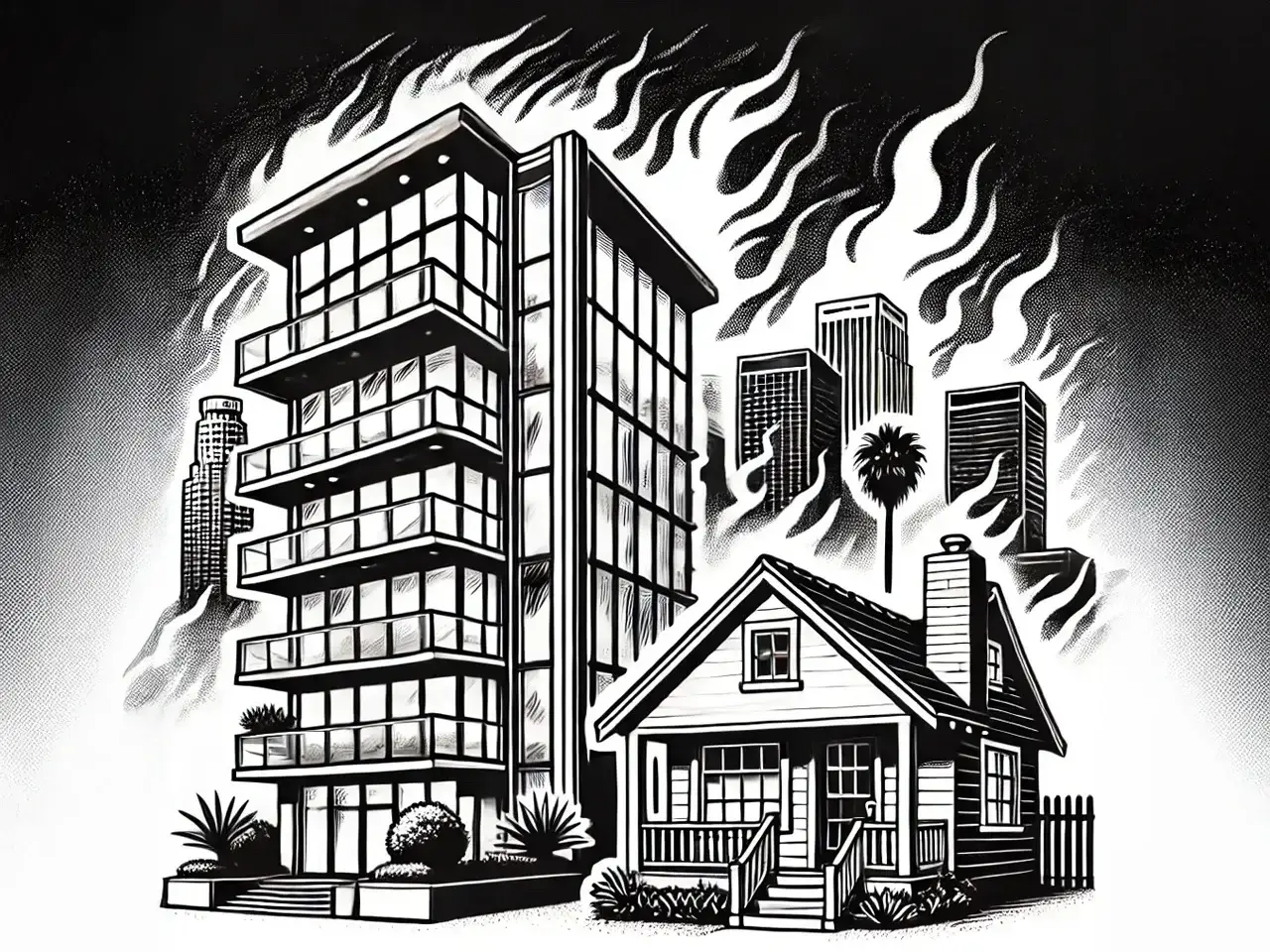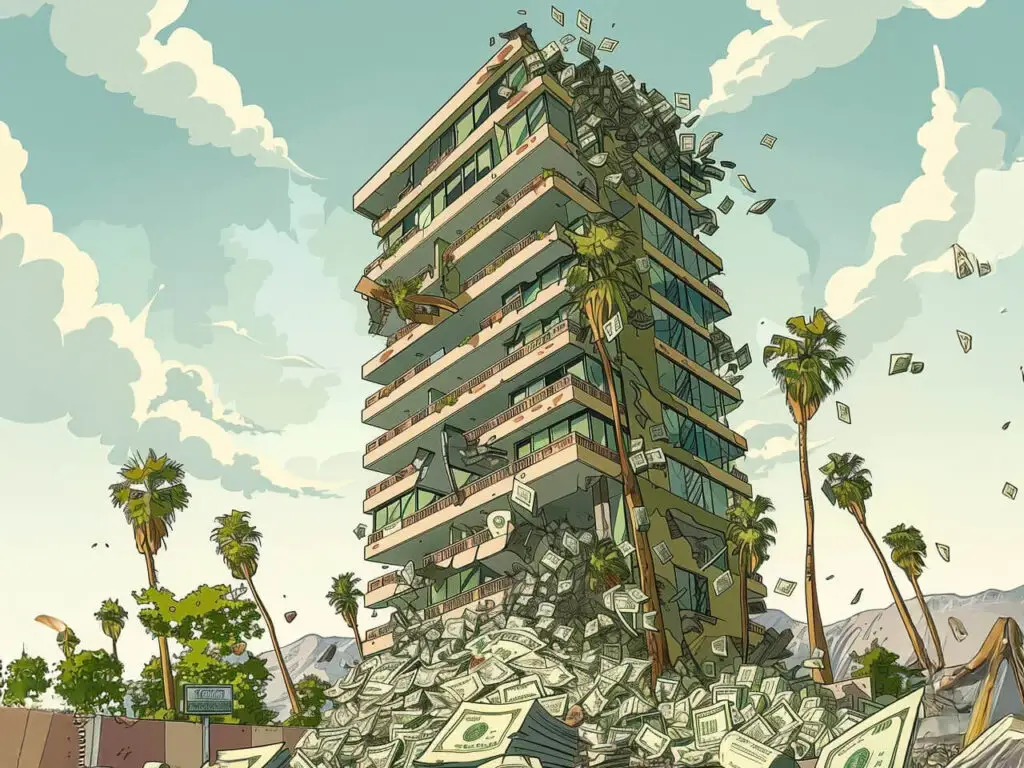If your condo was close enough to the recent wildfires that you packed a Go Bag, you may be safe from cancellation of your HOA’s master insurance policy, at least this year.
But it probably won’t be because of the state’s moratorium on cancellation of residential property insurance near the burn areas. At least not directly.
The Moratorium
California state law prohibits insurers from cancelling residential property insurance close to a fire perimeter for one year after a state of emergency has been declared.
Insurance Commissioner Ricardo Lara has issued a list of zip codes considered close enough to a fire that a policy of residential property insurance is protected by the moratorium on non-renewal.
For condominium associations, though, the big question is whether their master policies are considered residential.
Defining Residential Property
The commissioner’s order cites this definition of residential property insurance:
“...a ‘policy of residential property insurance’ shall mean a policy insuring individually owned residential structures of not more than four dwelling units, individually owned condominium units, or individually owned mobile homes, and their contents, located in this state and used exclusively for residential purposes or a tenant's policy insuring personal contents of a residential unit located in this state.” (emphasis added)
A master condominium policy insures the interests of individually owned condominium units. For those with walls-in coverage, it is the unit owners’ primary coverage for everything that’s part of their unit. Sounds like it’s covered under the moratorium, right?
The answer turns out to be much more complicated.
One HOA’s Experience
A CondoWonk reader wrote that his building’s insurance policy had been cancelled, despite being in one of the designated zip codes. The carrier stated that the policy was considered commercial, not residential, and therefore not protected under the moratorium.
The reader filed a request for assistance with the Insurance Commissioner.
And I wrote an email to the press office at the commissioner’s office, asking whether the moratorium applied to condominium master policies.
Seeking Clarification
A week later, neither one of us had gotten any response.
Having heard nothing from the press office, I filled out the form on the insurance commissioner’s general information portal and asked, “Can the Insurance Commissioner provide clear guidance that the existing moratorium protects residential condominium association policies?”
The commissioner’s office called me back. The employee stated that the moratorium protected HO-6 policies but did not protect HOA master policies. (HO-6 policies are policies that individual unit owners can purchase for liability and contents.)
He also stated that the commissioner was supporting new legislation, SB 547, that would extend the moratorium to commercial policies. That, he said, would take care of condo master policies.
I asked whether this was the official position of the commissioner’s office and was told that for an official statement, I should contact the press office. Which I already had. But I tried again.
I left a voice message at the press office phone number and sent a second email. A few days later, I sent a third email, this time with a deadline two days later.
I didn’t get a response. As of this writing, I still haven’t.
Definition of Commercial Property
If enacted, SB 547, the bill to extend the moratorium to commercial property, would be added to Section 675 of the insurance code. The definition of commercial insurance under Section 675 covers “Loss of or damage to real property used or owned by a commercial or industrial enterprise.” A little further down, the code states,
“As used in this section, the term commercial or industrial enterprise includes a business operated for profit, a professional practice, a nonprofit organization, or a governmental entity.”
A condominium association is a nonprofit organization. In my understanding of the English language, it’s still not a commercial or industrial enterprise.
(Now is a good time to remind everyone that I am not licensed to practice law in the state of California and this is not a legal opinion.)
What Insurance Agents say
Insurance agencies that specialize in working with condominium associations gave helpful interpretations.
One told me, “From our understanding the California Department of Insurance (CDI) does not explicitly classify HOA or condominium master policies as ‘commercial’ within the Insurance Code. However, in practice, these policies are treated as commercial by insurance carriers and the industry at large.”
Another said that an HOA policy is classified as a commercial policy because it’s written as a business owners policy but added, “We expect carriers are going to take a very conservative approach to non-renewals in the zip codes called out in the bulletin.
In her opinion, optics, not law, is the reason condominiums likely won’t be canceled. “The insurer understands that it is a residential community, and the PR fight they would be in if they non-renewed a project that was in the identified zip code would be massive,” the agent said. “We expect they would try to avoid that headache.”
That prediction was uncanny.
Reversing a Non-Renewal
Here’s what happened to the reader with the non-renewal.
The reader eventually got a letter from the insurance commissioner saying his HOA’s insurance would be renewed after all. The letter did not say whether the moratorium protected master policies. In this case, though, the insurer agreed to continue the coverage.
The insurance commissioner’s letter was followed a week later by a letter from the insurer. The letter restated its position that the moratorium for residential policies did not include a business owner’s policy.
Nonetheless, the insurer was renewing the policy.
It now claimed the non-renewal had been issued because a golf course, which was diagonally across an intersection and a couple of buildings away, had been identified as “brush.” After reconsideration, the insurer wrote, “we have determined that classifying this as brush was an overly stringent approach.” The nonrenewal was withdrawn.
On the aerial photograph included in the letter, the entire golf course is vivid green.
Here’s why it matters
When condominiums are classified as commercial property, it’s easy to forget that we are talking about homeowners. Instead, they are something else. “Commercial.”
The convention of classifying condo policies as commercial means that condo associations are not guaranteed the consumer protections provided to single-family homes. Instead, they are at the mercy of public relations and good will of the carriers, even though the plain language of the definition of a residential policy would seem to include condominiums.
Specific regulations for condominium master policies would be fine. Master HOA policies are more complicated than single-family home policies. They do need their own forms.
First, though, call it what it is: a residential policy. It protects the owners of individually owned residences.
Final thoughts
As of this writing, SB 547 has passed a hearing of the Senate Standing Committee on Insurance. In that hearing, State Senator Sasha Perez, a bill sponsor, stated that the bill would expand the moratorium protections to “businesses, homeowners associations such as HOAs, condominiums, affordable housing units, small businesses, nonprofits and other commercial entities…”
A speaker on behalf of an insurance organization stated that commercial risks in general were too broad a category to be protected by a moratorium. However, the organization endorsed the legislation with an amendment that would limit its protection to condominium associations and other “commercial habitational risks.”
Insurance Commissioner Ricardo Lara spoke in favor of the bill, which he said protected “Main Street.” He did not mention condominiums or HOAs.
CondoWonk will keep an eye on SB 547. In the meantime, if you are in one of the zip codes protected by the moratorium and your master policy is canceled, you can file a Request for Assistance with the insurance commissioner’s office. Let me know what happens.








